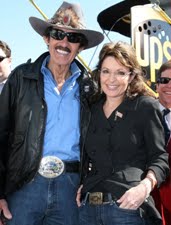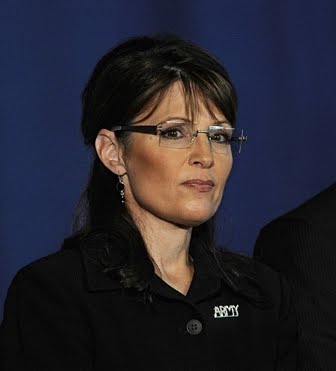Yes! Thank you! I said that months ago. I don't expect this book to delve into the geopolitical impacts of anything; it's a memoir. It's Palin saying, "Now that we've maybe calmed down a bit, here's who I really am; here's the real story." Back to Continetti:I don't typically watch Oprah. But I won't miss Monday's interview with Sarah Palin. The appearance is supposed to be about Ms. Palin's new memoir, but a lot more will be riding on the encounter than book sales.
After last year's brutal presidential campaign, Ms. Palin is now reintroducing herself to the American public.
Nothing less than her future in American politics—and a possible run for the White House in 2012—hangs in the balance.
Ms. Palin has two problems. The first is that she's become one of the most polarizing figures in the country. The second is that voters continue to worry about her qualifications for the presidency, a concern that her abrupt resignation from office last July intensified.
Lucky for her, both problems are solvable. Since Ms. Palin appeared on the national stage, the left has unfairly demonized her. Blockbuster interviews and book tours will humanize her.
More important than these public appearances is Ms. Palin's message. She needs to adopt a market-friendly populist agenda to strengthen her policy credentials and make her seem less partisan to independent voters. A bipartisan, center-right approach should come easily to her. That's how she won her race for governor in 2006.
Ms. Palin's unpopularity—the result of horrendous media coverage and her role as the McCain campaign's pitbull—is a major political obstacle. Her unfavorable rating
hovers around 50%, the point at which most politicians would reach for the Valium.
An October Gallup poll put Ms. Palin's favorable number at 40%, her lowest rating to date. In a November Gallup survey, 63% of all voters said they wouldn't seriously consider supporting her for the presidency.Yet Ms. Palin isn't as unpopular as John Edwards, and she has a higher approval rating than Nancy Pelosi. As Hillary Clinton's career shows, public perception changes over time. Ms. Palin remains highly popular among Republicans (69% favorable). But the Democrats' striking antipathy to the former governor—she has a 72% unfavorable rating among them—drives down her overall approval.
Independents are a different story. These are the folks who decide presidential elections, and they are divided on Ms. Palin. In last month's Gallup poll, Ms. Palin had a 48% unfavorable and 41% favorable rating among independents. Not good, but not insurmountable. Flip those percentages, and they could be serving moose burgers in the White House in 2013.
What drives independents' uncertainty is their feeling that Ms. Palin isn't up to the job. Independents blanch at her perceived lack of expertise on issues unrelated to
energy or abortion. They look at Ms. Palin's disappointing interview with Katie Couric last year, or laugh at Tina Fey's impression on "Saturday Night Live." Her resignation—still not fully explained—stokes their worst fears.
However, other Republican politicians have profited when they exposed received wisdom about them as false. In 1980, Democrats portrayed Ronald Reagan as a dim-witted ideologue bent on starting a nuclear war.
Then Reagan debated President Jimmy Carter. The public watched as a conservative pragmatist with a puckish wit unmanned a self-important, humorless liberal. Suddenly, Reagan was no longer the "dangerous" choice. He won handily.
Could Ms. Palin follow Reagan's example? Maybe. She'd need to return to her 2006 playbook.In Alaska, Ms. Palin didn't run as a culture warrior. She focused on issues with overwhelming public support: ethics reform, a revised oil tax, and more competition and transparency in the effort to build a natural gas pipeline. She took the conservative vote for granted and focused on winning independents and even some Democrats.
The 2006 Palin model looks a lot like the approach that Virginia's next governor, Republican Bob McDonnell, used to win his election last week. It means applying conservative principles to problems like the economy, health care, and out-of-control federal spending. It means addressing voter concern that big government and big business are in cahoots, heaping expensive burdens on small businesses and individual entrepreneurs.
During her book tour, Ms. Palin is sure to mention that the Obama administration's opposition to offshore drilling and domestic nuclear power, and its support for an onerous cap-and-trade scheme, will raise energy prices across the board. But she also might spend less time discussing campaign intrigue and Alaska trivia, and more time outlining how to spur job creation through tax reform.
She might mention, too, that the Democrats' health-care plan would hike taxes, raise the cost of doing business, and lead to rationing down line. She might point out that, on top of health care, the stimulus and bailouts, President Obama's 2010 budget will further bury the United States in debt. Every time the media try to shift the conversation to personal gossip or past mistakes, Ms. Palin should pull it right back to how the Obama agenda will hurt the middle class.
Oprah will be aghast. The Democrats will be outraged. But independents will be listening. And the rehabilitation of Sarah Palin will have begun.



















No comments:
Post a Comment